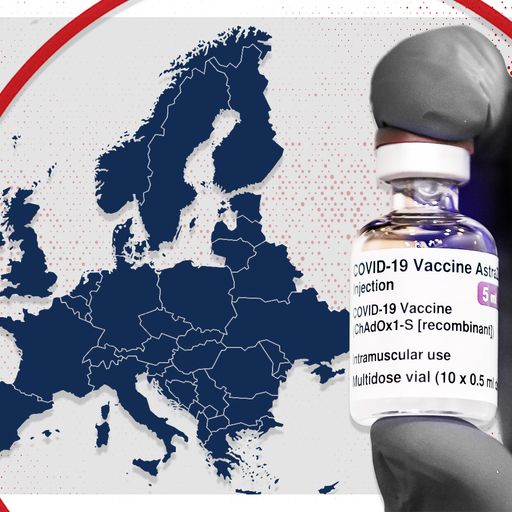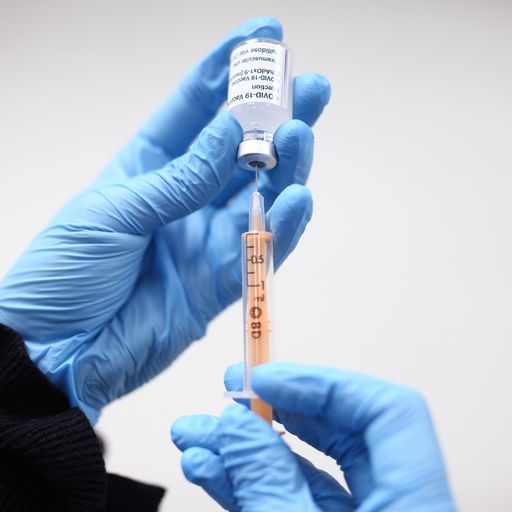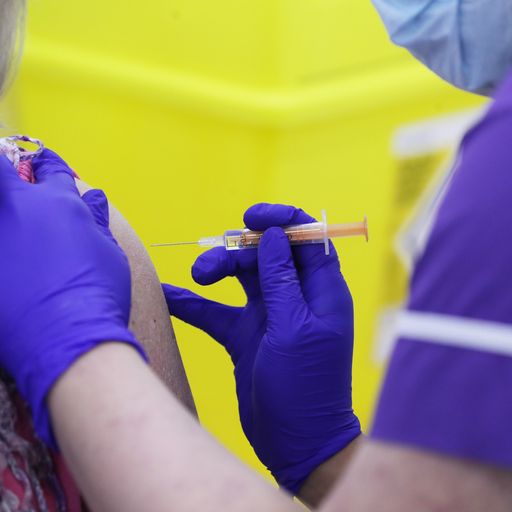The EU's vaccination drive has been a bumpy ride - but its rollout of the Oxford/AstraZeneca jab has been especially so.
In November, the European Commission celebrated its plan for a common approach, heralding the creation of a "health union" along with its deal to purchase at least 300 million doses from the British-Swedish drugmaker.
This deal came with the option of purchasing another 100 million doses for its 450 million citizens.
Four months later, however, and the bloc's programme has been beset with shortages and delays, and has prompted a very public and very bitter row with the pharmaceutical company.
It then almost resulted in a nuclear option - triggering Article 16 of the Northern Ireland Protocol, before peaking again on Thursday when the commission blocked a shipment of vaccines bound for Australia.
So - how did we get here?
22 January, shortages announced
The European Medicines Agency (EMA) approved the AstraZeneca jab for use on 29 January - but the issues had already begun.
Exactly a week earlier, the company informed Brussels there would be a 60% shortfall due to a production glitch in its European supply chain.
It left the EU expecting deliveries of 31 million doses by the end of March instead of the agreed 80 million.
Coupled with a temporary shortfall of the Pfizer/BioNTech vaccine, the drive was off to a bad start.
25 January, efficacy questioned in German report
Handelsblatt, a German newspaper, published a report suggesting the efficacy of the AstraZeneca jab could be as low as 8% in over-65s.
The claim was rebutted by the German health ministry as well as AstraZeneca and Oxford University, which said there had been "no basis" for the assertion.
28 January, Germany advises against use in over-65s
On the eve of the EMA's approval of the jab, health authorities in Germany said the vaccine should not be administered to people over 65, saying there was a lack of data on this age group.
France, Greece, Denmark, the Netherlands, Sweden, Poland and Austria eventually followed suit with the same restriction.
Italy initially limited the jab to under 55s but at the end of February raised that to adults up to 65 years old.
Belgium and Spain have limited it to under 55s.
28 January, EU orders inspection at AstraZeneca site
Quarrels ensued in the days after the shortfall was announced as EU officials urged AstraZeneca to limit the expected cuts.
The commission also threatened to impose strict export controls to ensure the bloc received its fair share of the vaccine, and later pointed to a clause in its contract which said doses would be delivered from two UK-based factories.
However, Pascal Soriot, the French chief executive of AstraZeneca, said no timetable for deliveries had been agreed, adding that the contract included a best-effort clause.
He said the UK's contract had also been signed three months before Brussels, and it stipulated that vaccines made in the UK should be supplied to the UK first.
In response, the EU hinted that Mr Soriot's revealing of this information - said to be confidential - could amount to a breach of contract.
But to top this busy couple of days, the EU on 28 January ordered officials to inspect AstraZeneca's facility in Seneffe, Belgium, to confirm there was an issue with supply.
29 January, AstraZeneca jab approved; EU publishes its contract
The EMA approved AstraZeneca for use on 29 January for all adults over 18 years old - despite conflicting recommendations from Germany.
French President Emmanuel Macron then dampened confidence further, saying the jab was "quasi-ineffective".
It was also the day Brussels released a heavily-redacted version of its contract; although, this appeared to create more questions than it answered.
29 January, EU moves to trigger NI protocol
The procurement row soon reached its first peak as the commission made moves to trigger Article 16 of the Northern Ireland Protocol to prevent vaccines entering the UK.
This would have seen checks made at the border of the Republic and Northern Ireland.
London, Belfast and Dublin widely condemned the move - and it ultimately resulted in the commission making a swift U-turn.
February-March, low uptake reported
Bad publicity in earlier weeks appeared to have a knock-on effect for AstraZeneca in Germany as slow uptakes of the jab were reported.
Meanwhile, the head of Germany's Standing Committee on Vaccination (STIKO) Thomas Mertens said "the whole thing has somehow gone badly," and insisted the vaccine was "very good".
He told broadcaster ZDF: "We never criticised the vaccine, we only said that the data was not good or not sufficient for over 65s."
4 March, U-turns on recommendations for over-65s
Germany later reversed its recommendation on restricting jabs to under-65s only, while France partially U-turned by allowed the AstraZeneca vaccine to people aged between 65 and 74 with pre-existing health conditions.
It comes after fresh data published by Public Health England (PHE) based on the UK's vaccine rollout showed protection against symptomatic COVID in those over 70, four weeks after the first jab, ranged between 60-73% and 57-61% for the Pfizer/BioNTech vaccine.
4 March, EU blocks shipment to Australia
As AstraZeneca failed to meet its contractual commitments, Italy and the European Commission blocked a request to export 250,000 doses from its Anagni plant near Rome.
The move came under a new export control system that passed into law on 30 January and was the first time it had been used by a member state.
In a statement, the Italian foreign ministry cited reasons such as Australia being considered "not vulnerable" due to a low number of COVID cases, along with the shortage of vaccines in Europe.
It is understood the doses will now be redistributed within the EU, where about 8% of the population has been vaccinated, compared with more than 30% in the UK.









